The African American Business District Monument
Rock Hill, South Carolina
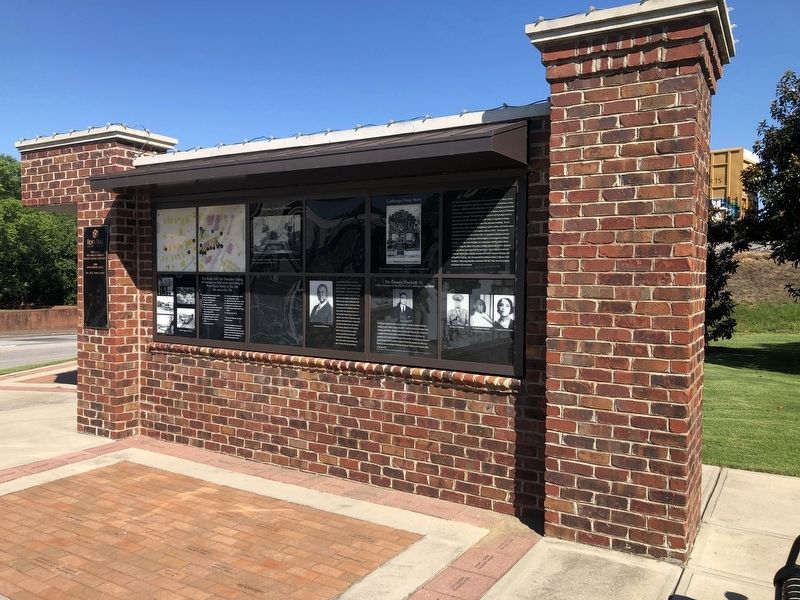
The Rock Hill City Directory listing of businesses that were operating on West Black Street in the late 60s and early 70s.
1. Blue Bird Taxi Company (1972)*
2. Brown's Billiards (1971)
3. People's Undertaking Company (1972)
4. Mutt's Pool Room (1968)
5. O.K. (Jackson's) Barber Shop (1966)
New ownership listed Hardin's Barber Shop (1971)
6. Chicken In The Basket (1972)
7. Gathings Drug Store (1972)
8. Mills Texaco Service Station (1972)
9. Palace Grill (1971)
10. Chisolm's Furniture Store (1971)
11. City Barber Shop (1971)
12. McRae's Shoe Shine Parlor (1972)
13. Hunt's Shoe Shine Parlor (1968)
14. Capital Taxi Company (1971)
*The last year businesses was listed in the directory
If you have additional information or photographs for any business located on West Black Street between Wilson Street and Trade Street, please contact Gladys Feely Robinson at [email protected]
Chisolm Funeral Home
Chisolm Funeral Home was located at 165 West Black Street (above). After demolition, Chisolm Funeral Home relocated to 442 West Main Street.
Andrew David Chisolm, Jr. was born in York County. He received his early education from Friendship College.
Later Mr. Chisolm attended South Carolina State College and graduated from Echles College of Mortuary Science in Philadelphia, Pennsylvania, in 1926. His career began with the Rock Hill Undertaking Company. The funeral home was located in 128 West Black Street from 1936 to 1938. The business later moved to 165 West Black Street, where it remained until the early 1970s. Mr. Chisolm is buried in Barber Memorial Cemetery in Rock Hill. After the demolition of the funeral home, Mr. Chisolm relocated to 442 West Main Street. The funeral home has changed names several times since his death, having been called Johnson's Funeral Home and Clemons Funeral Home, and later Clemons-McCray Funeral Home.
Gathings Drug Store
1937 - Located at 119 West Black Street. Later moved to 168 West Black Street.
The business began s the Imperial Drug Company on West Black Street, owned by W. Stalk Alston. In 1911, the name was changed to the Ideal Pharmacy and the business was located at 107 West Black Street. Dr. John A. Gathings purchased the Ideal Pharmacy. He had graduated in Pharmacy from Meharry School of Medicine in Nashville, Tennessee. The Ideal Pharmacy moved to 119 West Black Street in 1924, where it remained until 1943. In the early 1930s, Dr. Spofford Gathings opened a dental office on the second floor of the pharmacy building. He had graduated from Claflin
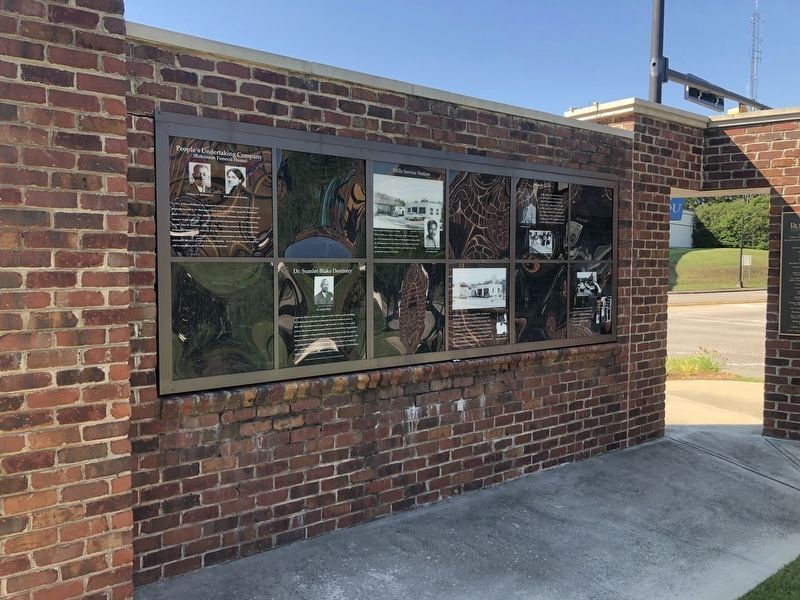
Dr. Dewey Duckett, Sr.
(Office located on the top level of Gathings Drug Store)
Dr. Dewey Duckett was born in Union, South Carolina. He attended Harbison College in Irmo, South Carolina, Johnson C. Smith University in Charlotte, North Carolina, and Meharry Medical School in Nashville, Tennessee. Dr. Duckett was a member of the South Carolina Medical Association and served as first vice president of the South Carolina Branch of the NAACP. Dr. Duckett was co-founder of the Omega Psi Phi Fraternity's National Talent Hunt Program. His office was located on the second floor of Gathings
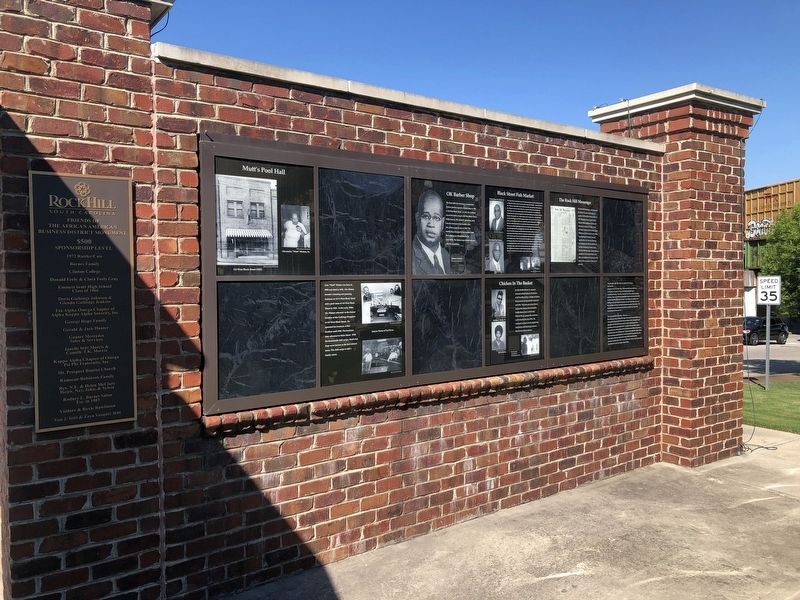
Information from "Inventory of the Dewey M. Duckett, Sr., Papers, 1946-1989," Avery Research Center for African American History and Culture, College of Charleston.
People's Undertaking Company
(Robinson Funeral Home)
In 1911, William M. Robinson, Jr., founded the People's Undertaking Company. It was originally located at 117 West Black Street from 1917 to 1925. Upon Mr. Robinson's death in 1931, his wife, Mrs. Johnnie Mae Ramseur Robinson, became the owner and operator of the business. Later, the funeral home relocated to 111 West Black Street. In 1960, John W. Ramseur, nephew of Mrs. Robinson, joined the business and later became the manager. On March 3, 1973, the funeral home moved to 527 South Dave Lyle Boulevard and was renamed Robinson Funeral Home. In 2011, the business celebrated 100 years of service to the community. As of 2015, the funeral home was still in operation at 527 South Dave Lyle Boulevard.
Dr. Sumler Blake Dentistry
In the year 1916, Dr. S.H. Blake returned to Rock Hill to practice dentistry. Dr. Blake has the distinction of being the first black dentist to locate in Rock Hill. He practiced for 51 years until his death. Dr. Blake was a native of Rock Hill, the son of the Reverend Hillard and Susie Blake. He graduated from Livingstone
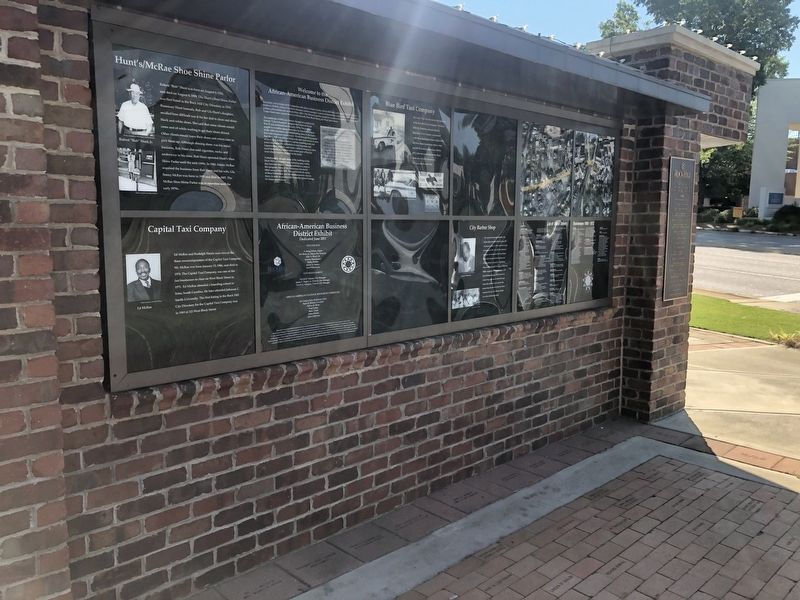
Information from History of Dentistry in Rock Hill, South Carolina, by Addie Stokes Mayfield
Mills Service Station
Thomas Mills was a native of Ebenezer, South Carolina and the son of the late John Bunyan Mills and Elizabeth Henderson Mills. Mr. Mills opened his service station on West Black Street in 1947 after returning from service in the Navy in World War II. He operated the business for 42 years.
Mr. Mills was married to Alma Lightfoot Mills. Mrs. Mills said that the Mills Service Station was the only black-owned service station at the time and this was a service to the community. The station was located at 127 West Black Street prior to relocating to 131 West Black Street. It was one of the last businesses to close on West Black Street. After the demolition of the building, Mr. Mills moved his business to 599 Wilson Street where he continued operations until he retired in 1988. Mr. Mills died on July 28, 2008. The business is no longer in operation.
Minute Grill
George Thompson
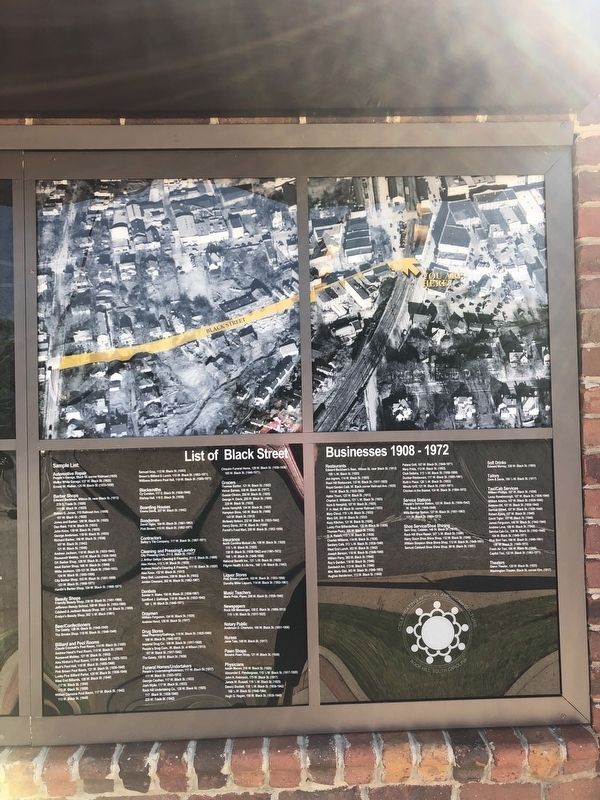
Mr. Thompson once said, "The real reason behind the business' success has been the people." Mr. Thompson was born on December 26, 1926, and died February 13, 2005. The business is still in operation at 587 Wilson Street.
Mutt's Pool Hall
Alex "Mutt" Hinton was born in 1900 and died in 1992. Mr. Hinton owned a cleaning and pressing business at 113˝ West Black Street and a pool room at 113 West Black Street in 1925. In the early 1940s, Mr. Hinton relocated to the former location of the Gathings Drugstore at 119 West Black Street. He operated his business at this location until 1968. The business later relocated to Main Street. With his homemade chili recipe, Mutt's hot dogs were known as the best around town. The chili recipe is still a family secret.
OK Barber Shop
Rock Hill City Directory revealed that Andrew Jackson opened a barber shop in 1921 at 118 West Black Street. In 1942, Mr. Jackson moved his barber shop to 128 West Black Street.
Black Street Fish Market
Rev. Iday Watson and Pastor James H. Smith entered into a partnership agreement on March 10, 1958, to operate the West Black Street Fish Market. After the death of Rev. Watson in April 2002, Pastor Smith became the sole operator of the business. Rev. Watson was born in Rock Hill, S.C. on April 10, 1909, to the late Bob and Tillie Watson. He was married on July 31, 1934 to Lula Ware. He and his wife founded the Rose of Sharon Baptist Church in Rock Hill and the Watson-Malone Chapel in Fayetteville, N.C. Pastor Smith, born in Sumter, S.C. on July 25, 1933, was the son of Murray and Viola Singleton Smith. He is married to Essie Beckham Smith. As of February 18, 2016, Rev. Smith still resides in Rock Hill. During an interview with Pastor Smith, he revealed that African Americans made the businesses on Black Street. Each business was considered a thriving business due to the support of the customers which were 99% African Americans. The money from the businesses was circulated back into the African American community. Pastor Smith said that on any given weekend on Black Street, you could hear the sound of soul music blaring from the jukebox as the crowd sayed to the rhythmic beat. There was the sound of laughter as well as the familiar smell of delicious cuisine. Pastor Smith state that the Fish Market was not only a place of entertainment, but was also a community grocery store during the day and sold penny candy, cookies and soft drinks to kids. They sold fried fish or raw fish, whichever the customer wanted. The Fish Market closed in 1970.
Interview with Mr. James H. Smith courtesy of Elaine Mayes
Chicken In The Basket
In 1961, Freddie Barnes, Sr., opened a restaurant called Chicken in the Basket at 134 West Black Street. Freddie and Sylvia Barnes owned and operated the restaurant until 1964. That same year, James Barnes acquired the business from his brother, Freddie Barnes. James and his wife, Willa M. Barnes, operated the restaurant until it closed in the early 1970s. The restaurant was known for having the best fried chicken and hamburgers in town. The business did not relocate.
Rock Hill Messenger
The Rock Hill Messenger, a newspaper for the African-American community, was located at 130 East Black Street and later at 115˝ West Black Street. Captain Phillip Thomas White established the Rock Hill Messenger on January 10, 1896. A native of Chester County, South Carolina, Captain White was actively involved in civic affairs, from local Baptist churches to masonic organizations. For a time, the Messenger was designated the official publication of the black freemasons in South Carolina. The Rock Hill Messenger ceased publishing sometime in 1921. Captain White was the editor and publisher of the January 26, 1900, edition of the newspaper, which is shown to the left.
(Herald Article, 2002) Black Street once Bustled with Business
By Jason Cato
Long gone are the City Barber Shop, Mutt's Pool Hall, Brown's Billiard and Capital Club Company, Watson's Fish Market and the People's Undertaking Company. All of these businesses have been reduced to distant memories. Black-owned businesses along Black Street in downtown Rock Hill are all but forgotten relics of the city's past. Grassy hills and a couple of new buildings are the only things that remain from the spot where they once stood, between Wilson and Dave Lyle Boulevard formerly known as Trade Street. The buildings that once housed the dreams of black entrepreneurs in Rock Hill were demolished in the early 1970s.
Taken from Feb 2006 Herald Article - What it was.......
Black Street, just a block off Rock Hill's Main Street central business district, was a thriving black business district from the early 1900s to 1973. During the era of segregation, the Black Street business district became a gathering places for generations of black people in Rock Hill. It was lined with pool halls, barbers shops, eateries, shoe shine parlors and other businesses from Wilson Street to the railroad tracks (now Dave Lyle Boulevard). The street was originally called Church Street, according to publish histories, but the name later changed to honor the Black family and the man considered to be Rock Hill's founding father, Alexander Templeton Black. Black was one of the city's earliest major land owners and donated the land for the original railroad depot.
Hunt's/McRae Shoe Shine Parlor
Robert "Rob" Hunt was born on August 8, 1916, and died on August 8, 1999. the Hunt's Shoe Shine Parlor was first listed in the Rock Hill City Directory in 1959. Rosemary Hunt Samuda, Rob and Ula Hunt's daughter, recalled how difficult was it for her dad to clean and shine black and white shoes. She said that some clients would come to sit while waiting to get their shoes shined. Other clients would leave their shoes and return later to pick them up. Although shining shoes was his main business, Rob Hunt also sold cigarettes, socks, and underwear in his store. Rob Hunt operated Hunt's Shoe Shine Parlor until the mid-1960s. In 1965, Sonny McRae acquired the business from Rob Hunt and his wife, Ula. Sonny Parlor was born in 1939 and died in 2007. The McRae Shine Parlor was in operation until the early 1970s.
Capital Taxi Company
Ed McRae and Rudolph Harris were two of the three owners/operators of the Capital Taxi Company. Mr. McRae was born January 15, 1906, and died in 1978. The Capital Taxi Company was one of the last businesses to close on West Black Street in 1971. Ed McRae attended a boarding school in Irmo, South Carolina. He later attended Johnson C. Smith University. The first listing in the Rock Hill City Directory for the Capital Taxi Company was in 1963 at 122 West Black Street.
Welcome to the African-American Business District Exhibit
For many years, before racial integration took place in South Carolina, Rock Hill had a thriving African-American business district. African-American business owners managed a variety of businesses—restaurants and shoe shine parlors, pharmacies and medical offices alike—for African-American people in an area of downtown that included Trade Street (now named Dave Lyle Boulevard), West Black Street, and West Main Street.
The landscape of this area forever changed as a result of the federal "Urban Renewal" program that followed World War II and continued into the early 1970s. The program sought to revitalize aging inner cities by demolishing some of the older structures and rehabilitating others in hopes that redevelopment would occur. It was through this program that Rock Hill was able to bring water and sewer service to areas of the City that did not have it, replace crumbling water and sewer infrastructure, undertake several important road improvement projects, and create a railroad overpass to allow travel between the eastern and western parts of the City even when a train is stopped on the tracks.
Unfortunately, though, many of the buildings in the Rock Hill's downtown core, including many within this business district, were demolished as a result of this program. Some of the businesses relocated to other areas of Rock Hill. This exhibit tells the stories of these businesses, and the business owners who ran them, in order to preserve this important cultural heritage for future generations.
Where did the names "Black Street" and "White Street" come from?
The names "Black Street" and "White Street" in Rock Hill, do not refer to race. Often, as cities developed, roads were named for the families who owned the lands. In the City of Rock Hill, Main Street divided the lands owned by the Alexander Black family and the Ann Hutchison White family.
Blue Bird Taxi Company
Mr. Leroy Dye was the owner and operator of the Blue Bird Taxi Company. The Rock Hill City Directory showed that the Blue Bird Taxi Company was located at 106 West Black Street from 1946 to 19961, 101 West Black Street from 1962 to 1968, and 150 West Black Street from 1969 to 1972. After the demolition of the Black Street site, Mr. Dye relocated to 729 Green Street until 1992.
City Barber Shop
Mr. Lamar Bowens operated the City Barber shop for more than 30 years. He was born on May 8, 1913, and died at age 85 on June 8, 1998. In 1951, Mr. Bowens' business was located at 103 West Black Street. He later moved his business to 123 West Black, where the City Barber Shop remained until 1971. Frances Bowens Miller, daughter of Lamar Bowens said that while growing up she lived at the barber shop. She wasn't allowed to go home after school, so she went to the barber shop and stayed until her father closed for the day. Mr. Bowen taught five of his children the trade.
Erected 2015 by City of Rock Hill, South Carolina.
Topics and series. This historical marker and monument is listed in these topic lists: African Americans • Industry & Commerce • Roads & Vehicles • Science & Medicine. In addition, it is included in the Historically Black Colleges and Universities series list. A significant historical year for this entry is 1926.
Location. 34° 55.564′ N, 81° 1.769′ W. Marker is in Rock Hill, South Carolina, in York County. Marker is at the intersection of Dave Lyle Boulevard (State Highway 122) and West Black Street, on the right when traveling south on Dave Lyle Boulevard. Touch for map. Marker is at or near this postal address: 79 Dave Lyle Blvd, Rock Hill SC 29730, United States of America. Touch for directions.
Other nearby markers. At least 8 other markers are within walking distance of this marker. Old Town Fact (within shouting distance of this marker); The A. Friedheim & Bro. And Smith-Fewell Buildings (about 700 feet away, measured in a direct line); From Mall To Main (about 700 feet away); Rock Hill (about 700 feet away); The Dalton Building (approx. 0.2 miles away); McCrory's Civil Rights Sit-ins / "Friendship Nine" (approx. 0.2 miles away); a different marker also named Old Town Fact (approx. 0.2 miles away); Andrew Jackson Hotel / Vernon Grant (approx. 0.2 miles away). Touch for a list and map of all markers in Rock Hill.
Credits. This page was last revised on June 22, 2021. It was originally submitted on June 22, 2021, by Devry Becker Jones of Washington, District of Columbia. This page has been viewed 758 times since then and 195 times this year. Photos: 1, 2, 3, 4, 5. submitted on June 22, 2021, by Devry Becker Jones of Washington, District of Columbia.